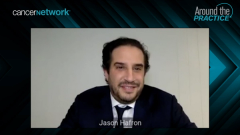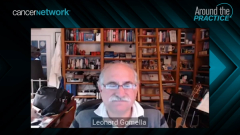
Treatment Options for High-Volume mCNPC
Daniel P. Petrylak, MD, leads the discussion on approaching treatment of high-volume metastatic castration-naïve prostate cancer.
Episodes in this series

Raoul S. Concepcion, MD, FACS: For this patient, we presented it as low-volume disease. In polling question 4, if the patient had high-volume disease—Jason, as you and Oliver outlined, high-volume disease is defined as visceral metastases or greater than 4 bony metastases, 1 outside the axial skeleton. Would this affect your treatment choice? In other words, would you use abiraterone–ADT [androgen deprivation therapy], enzalutamide-ADT, docetaxel-ADT, apalutamide-ADT? Then would you add on an antigen receptor–targeting agent, enzalutamide-abiraterone plus docetaxel-ADT or other? Dan, when you see these de novo metastatic castration-naïve patients, does the volume of disease play a factor for you relative to your therapeutic options?
Daniel P. Petrylak, MD: Yes, the volume of disease, the age of the patient, and comorbidities all play an important role. Recently we had the PEACE1 trial, where patients received standard-of-care docetaxel and then were randomized to receive observation or abiraterone. There was a significant improvement in rPFS [radiographic progression-free survival] in patients who received the 2 different treatments, docetaxel and abiraterone. Although we don’t have an abiraterone-alone arm, which would have been wonderful for that study, this is something I’m obligated to discuss with my patients. This is an intricate plan of action because the results were so striking. That needs to be administered. I’m going to look at the age, the aggressiveness, the comorbidities. Abiraterone may not be an appropriate drug for patients with preexisting cardiovascular disease because it can cause hypertension. There have been some reports out of Lenny’s institution [Thomas Jefferson University at Sidney Kimmel Medical College], where there’s an increased rate of cardiovascular morbidity in patients treated with abiraterone who have preexisting cardiac conditions. I’m going to look at my patient in terms of what the long-term goal is, how long they’re going to be treated, what their overall performance status is, and their volume of disease.
Oliver Sartor, MD: Dan, that’s very well said. I want to make a brief comment that goes back to Lenny. We have data in the castration-resistant setting over taking 1 abiraterone with food as compared with 4 without food. There’s also a Canadian trial that had 2 with food as opposed to 4 without. In each trial, each of which is relatively small, there did not appear to be a difference between the 1 with food or the 4 without food. There are no data in castration-sensitive [disease], but for people whose financial toxicity is substantial, you can cut the price of the drug by 75% and see if you feel like abiraterone may be appropriate.
Dan raised some good points. I don’t want to disagree with Dan, but if you think abiraterone is appropriate and financial toxicity comes to the 4, you could drop down to 1 or 2 abiraterone with food as a poor-man substitute. It’s not FDA approved, not really proven, but something I’ve done in practice when faced with the problem.
Raoul S. Concepcion, MD, FACS: We’ve gone to basically standard dosing regardless of body weight and everything with all these oral agents. Oliver, you’re bringing up an interesting point. Has anybody looked at potentially checking PK [pharmacokinetics], abiraterone, or enzalutamide levels to see metabolism and bioavailability and those types of things with PSA [prostate-specific antigen] response?
Daniel P. Petrylak, MD: That’s been done…. It was published in JCO [Journal of Clinical Oncology] a couple of years ago in castration-resistant disease. I always bring up a really interesting point because we know the PK of docetaxel is different if there’s testosterone on board. If you want to avoid that, perhaps you wait. In most of these trials, if you have all these trials administer abiraterone within 3 months of starting the initial androgen deprivation therapy, if the testosterone is down to castration levels within a month, I don’t think the PK will make much of a difference. It’s going to be about the same. You probably can get away with it. If you want to formally evaluate that, you’d have to do that at the time that you’re castrating the patient, but it’s probably not going to be any different. It’s a very interesting and an important point.
Raoul S. Concepcion, MD, FACS: Do medical oncologists have any experience with the generic forms? Not necessarily for this patient, but in general, the generic forms of abiraterone vs the Janssen product. Do you have any experience with that, either from using it or how expensive or inexpensive it might be?
Oliver Sartor, MD: Price is better. It’s hard to evaluate. I know you can go to Costco pharmacy and get some good deals. It’s hard for me to endorse anything beyond that because I can speak to price only. I can’t speak to efficacy.
Daniel P. Petrylak, MD: There’s the new Kirkland abiraterone. That’s a very interesting point. I haven’t seen much of a difference in price with the generic in my experience. Maybe it’s regional and dependent upon insurance, but I haven’t seen much of a difference.
Jason M. Hafron, MD, CMO: To expand on that, the problem with generics is you can’t get foundation support. It sometimes works against you if you can’t get that foundation support for a generic. It’s sometimes counterintuitive, but it’s more challenging to write for the generic.
Raoul S. Concepcion, MD, FACS: Jason, we know there’s another branded drug, microparticle abiraterone? Do you have any experience with that?
Jason M. Hafron, MD, CMO: It’s limited. We’re trialing a granule that you can put in a liquid. But for the 1 you’re referring, the data are limited; not a great experience. I want to go back to PEACE1, though. Dan brought up PEACE1. I’m just a community urologist treating patients, and I’d love to hear the panel’s response. When I saw those data, I was blown away with the rPFS [radiographic progression-free survival] and OS [overall survival] from ESMO [European Society for Medical Oncology], and it was really impressive because this is the first major trial since 2015. Prior to that median survival was 3 years. When you look at the data, the median survival is going past 5 years. In my book, this was is a game changer in how to manage this high-volume patient with mCSPC [castration-resistant prostate cancer]. I’m curious if you guys see it that way, or you still have some questions about it?
Oliver Sartor, MD:A couple of issues. No. 1, the appropriate control should have been ADT-abiraterone because we don’t know if docetaxel adds value. No. 2, and 1 of the reasons I didn’t discuss PEACE1, is that the high-volume subset was the only subset that benefited. If you look at Grain’s presentation, the low-volume subset had no survival benefit. Now the rPFS was better, but we don’t treat people for our PFS [progression-free survival] in general. We want that OS benefit, and that was high-volume disease-restricted funding.
Daniel P. Petrylak, MD: That was my point before, and it helps us answer the question when a patient comes into the clinic and says, “Doc, I want the kitchen sink thrown at me. I want everything possible done. I want everything up front.” For low-volume patients, there’s no major justification for it. For high volume, there is.
Raoul S. Concepcion, MD, FACS: Lenny, I’m going to give you the last word. Dan made some comments when he was talking about what patient comorbidities he was looking at. He mentioned the cardiovascular dysfunction that may be associated with abiraterone. We haven’t talked about it—it’s not really part of this—but when you see a patient’s cardiovascular history, how strongly are you trying to determine whether to use an LHRH [luteinizing hormone-releasing hormone] agonist or oral antagonist?
Leonard G. Gomella, MD, FACS: That’s certainly an ongoing debate. Our mantra at the multidisciplinary Kimmel Cancer Center is that even if you have a urologist or a GU [genitourinary] medical oncologist caring for you, you need a primary care doctor to organize your overall health. We rely on that primary care doctor to make sure we have good cardiovascular status. Dan mentioned the hypertension and the other problems with abiraterone. So we make sure patients have a good head-to-toe doctor, and we make sure we comanage the patients because I can’t evaluate how significant or insignificant somebody’s cardiovascular disease might be. We’re getting to this phase right now, where men are living longer and longer. These issues are going to become more prominent as men move into many years of being on these agents. We don’t know what the long-term impact is. We don’t use a lot of the oral agent. At Jefferson, we have limited experience with it because we often get into insurance problems in the Philadelphia market with an oral agent. The injectables we never have an issue with, but these are all things we have to look at: quality of life and quantity of life. With all these options, we’re going to be under more burden to customize the treatment for a patient based on all aspects of their life: financial toxicity, comorbidities, their expectations. We’re throwing the kitchen sink at people. Some people want that. Other people say, “I’m good. I’ve got my 18 great-grandchildren. I don’t need all that.” It’s got to be very customized.
Raoul S. Concepcion, MD, FACS: Very nicely said, Lenny. A great take-home point to conclude this is toxicity. We’ve always thought about toxicity as 1 big physiologic, but Dave Penson gave a nice talk a couple of years ago about how we need to consider financial toxicity in this age of multiple drugs and the cost associated with targeted agents.
Transcript Edited for Clarity
Newsletter
Stay up to date on recent advances in the multidisciplinary approach to cancer.












































